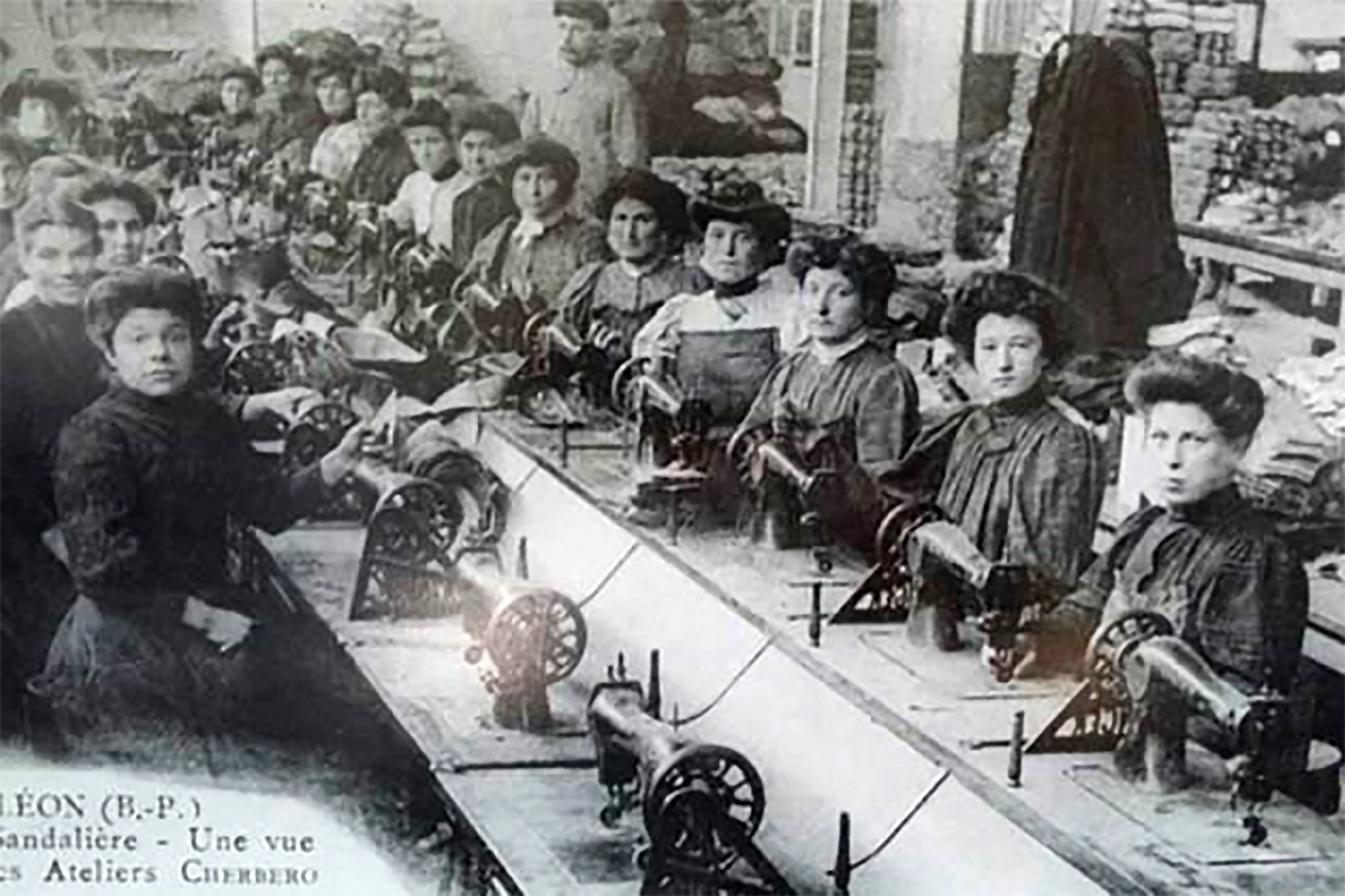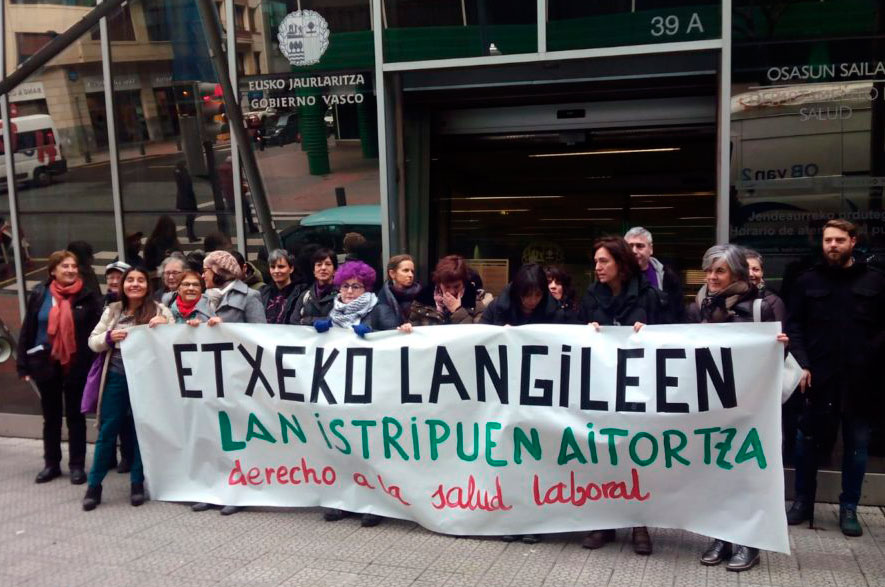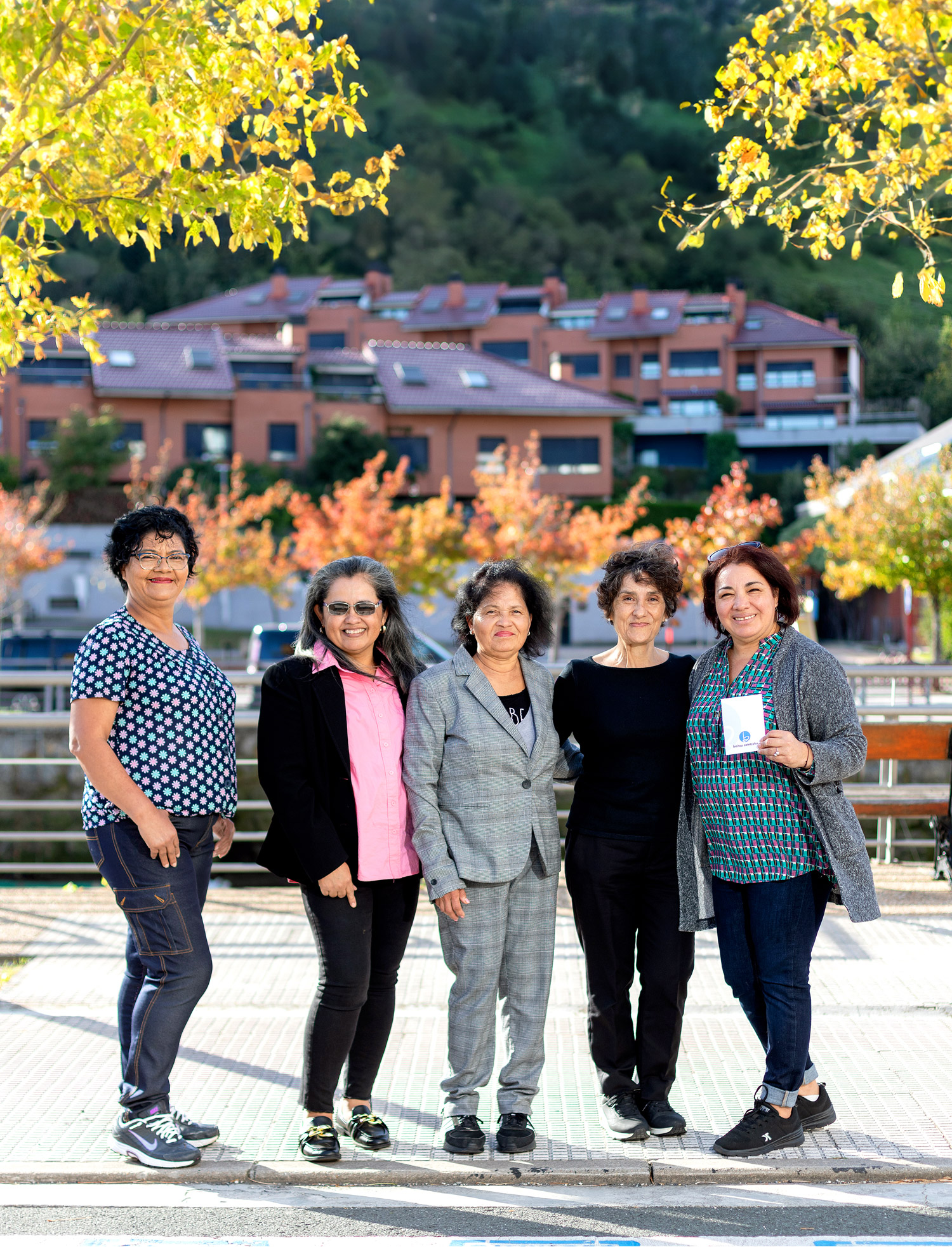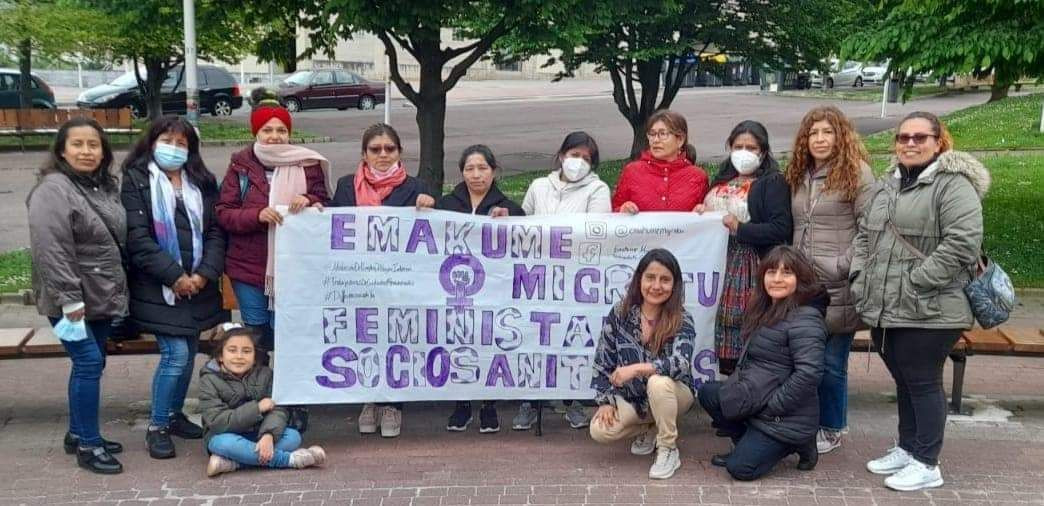Reform of the Aliens Act, a false solution that abandons Group Ya ' s struggle
- Fernanda Callejas, Tatiana Romero, Leo Bueriberi and Vanessa Uyiguosa participated in the debate "The Work of Migrant Women and the Economic Situation", organized by Pikara Magazine.
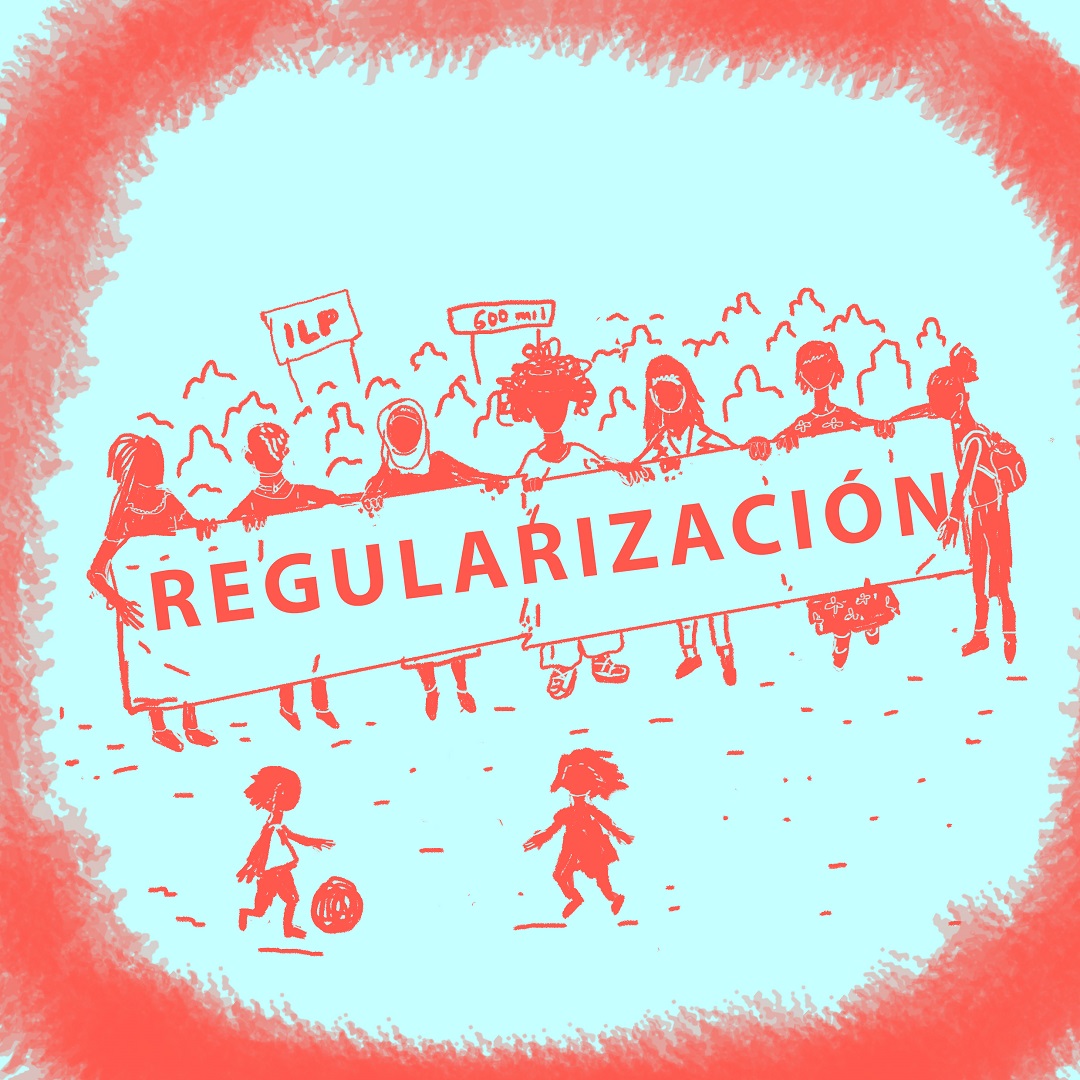
“It’s not the solution, it’s just a patch,” said Fernanda Callejas, decolonial activists from the Basque Country’s Network of Migrated and Racialized Women and spokesman for the Movement, when asked about the reform of the immigration regulations. Callejas, Nicaraguan, arrived in Bilbao in 2018, following the brutal and dictatorial response of Daniel Ortega. On 23 November, he participated in the “The Work and Economic Situation of Migrant Women” table, in the “The Right to Work and Health from an Anti-Racist Perspective” conference organized by Pikara Magazine. On Saturday morning, the flower room of La Sinsorga shared table with the independent feminist historian and researcher Tatiana Romero Reina, who was overwhelmed. The previous day Romero spoke at the Casa de las Mujeres de Vitoria-Gasteiz with Leo Bueriberi and Vanessa Uyiguosa, anti-racist militants, decolonial transfeminists and defenders of LGTBIQA+ rights, and African members descendants of the Network of Migrated and Racialized Women of Euskal Herria.

Tatiana Romero has agreed with Callejas that the objective of this reform is not to be a solution, but to divert the focus of the Popular Legislative Initiative [ILP] promoted by Grupo Universitario Ya. It informs us of the reading made by many of the members who participated in the regularisation process: “It’s the Goal that we’ve got. It was precisely when the ILP, the result of years of effort, went to the table. The ILP, which has had the most signatures in the entire Spanish democracy, 600,000 signatures, has emerged from the fabric of organizations of migrated and racialized people, and has focused on the impact we can make as political subjects”. The conditions involved in these regularizations are highlighted: “They say that this reform means regularizing 300,000 people a year, the ILP is demanding regularizing half a million people a year. We demand immediate regularisation in the unconditional working group. And in this reform there are conditions.” Callejas completed his exhibition with a report on the process of collecting signatures at the CAPV proposed by the HELa Support Group. “It was the Migrated Women of the Basque Autonomous Community who supported this struggle, along with Ongi etorri errefuxiatuak, although violence was more focused on our bodies. They belonged to the group of Migrated Women Socio-sanitary Feminists, in collaboration with young people, who really kept the 70,000 signatures collected in the CAV. Although they often say they are a glass generation, the young people who organize and manage themselves were helping us.”
“The ILP with more signatures, 600,000 signatures, has emerged from the fabric of organizations of migrated and racialized people, and has focused on the impact we can make as political subjects”
“The World Bank and the European Commission estimate that maintaining our welfare state requires about 250,000 migrants a year.” After reading this sentence of the reform of the Rules of Procedure, the participants underlined the traps and utilitarian treatment that reflects the text hidden under this reform: “The people who will benefit will be those who enter the system and contribute from it, but we all contribute to this society, with papers or without papers, migrated women are supporting Euskal Herria,” said Callejas. Leo Bueriberi stressed that regularization processes reward work or marriage, that is, the reproduction of the structure of the traditional family and its membership in the system. Romero, for his part, explained that another way to regularization processes is education. This path was added to the previous legislature: “Here too we should reflect on training, most of them vocational training. Why? Those 250,000 migrants are the ones who need to maintain the country’s economy. You can’t participate in these processes through training, for example, if you’re doing your PhD.”
The consequences that these processes leave on the mental health of migrated women were also put on the table in the two sessions: “In this system we cannot stop or leave: for maternity or for depression. I can’t stay to rest and heal, because doing nothing means my life is going to crumble,” said Bueriberi, worried.
Crisis surveillance system
Leo Bueriberi shared the experiences of several members working in the field of care. She stressed that during the pandemic many migrated women were expelled to prevent casualties after caregivers became infected. He also recalled that the resident household employee regime continues to represent the diagnoses of servitude hundreds of years ago: “Where is the frontier between work and leisure, the workplace is also the place of residence?” Callejas strongly denounced the fact that in 2024 the regime of resident household employees was authorized, “because governments have no capacity to deal with their crisis of care”, and recalled that many families benefit from the vulnerability of migrant women, from the need for a contract to regularize the resident status, “Why is the resident household employee scheme maintained? Because in some CAPV homes, dependent people need to be cared for 24/7. Basque households are also responsible. We will not talk about anti-racist Basque feminism as long as there is a regime of domestic workers residing in this territory.”
Many families take advantage of the vulnerability of migrant women, who need a contract to regularize their administrative situation, to hire a resident.
The rapporteurs also discussed the delay in the approval of academic qualifications and how this affects the employment opportunities of migrant women. Vanessa Uyiguosa stressed that it is impossible to leave this circle until the titles are validated and regularization processes are streamlined. “I do not understand the difficulty of approving a degree, looking at curricula, ensuring that they are similar and sufficient. In addition, in Abya Yala we learn everything that comes from the West, by the coloniality of knowledge”, Romero showed his indignation at waiting eight years for the approval of the title. The historian also denounced that universities in the Kingdom of Spain asked their students for a NIE (Foreign Identity Number) so they could graduate it.
Rationalisation of employment
“How can there be no rationalized employment if capitalism is racist? Is there a job that is not rationalized?” Romero recalled the article “Racialization of Employment and Violence” written by Florence Brizuela in May in Pikara Magazine: “Racialisation of employment and violence”. “Capitalism is racist and all the support of this machinery is in the hands of racialized bodies. European wealth is based on the exploitation, torture, slavery, kidnapping and murder of black people and people of origin,” the historian added. As an exercise of democratic memory and historical memory, he addressed 1492 and 711 to the territorial expansion of the Kingdom of Castile. It marked the beginning of racism and the sexual division of labour. “When we talk about the industrialization of Catalonia and the Altos Hornos de Vizcaya, we have to remember that all this has been possible thanks to the reception of millions of slaves and the expolio of the people of origin, and that is still happening, it is called colonialism and it is in all our territories,” he added.
“European wealth is based on the exploitation, torture, slavery, kidnapping and murder of black people and people of origin”
As far as education is concerned, Fernanda Callejas has pointed out that in schools teachers often encourage children of migrant women not to go to universities. Bueriberi talked about the strategies of a system that seeks to keep women migrated and racialized away from the spheres of power and eliminate the ability to imagine in other spaces or sectors. Based on their personal experiences in high school, Bueriberi and Uyiguosa stressed that schools do not take into account that many migrated and racialized people have a backpack or a burden, a reality, and that they often have to face the racism of their peers and, at the same time, respond to academic parameters.
Honest listening and historical reparation
Romero clearly linked the difficulties of access to housing with racism: “When you see your face or hear the accent, nothing is available.” He dismantled some of the lies I had heard: “How will you apply for help if you are in an irregular situation? You can’t ask for the library card, or make an account at the bank.” Uyiguosa and he himself denounced that many migrants have to pay for someone to point them at home when it comes to a right. Bueriberi also denounced the impossibility of making an appointment to renew documentation and residence permits in Foreign Affairs, “which causes many people to join the irregularity, because the deadlines are not met”.
“You have to create conflicts and be with people who are politically active on anti-racist issues, even if they are uncomfortable”
In order to face any kind of struggle, Callejas explained that for him is essential the network of migrated and racialized women from the Basque Country, a respiratory space based on care. In the face of the violence experienced in mixed spaces, it is often impossible to express everyday racism. Romero also stressed the importance of self-organizing, but both insisted that racism is not the responsibility of racialized and migrated people, and that whiteness requires historical reparation. Callejón ended by declaring the need to listen honestly: “We have to work together, but we have to respect our processes and be willing to be uncomfortable. We must all understand that we have been socialized from a racist, colonial and supremacist point of view, because from there everything has nothing to do with being a good or bad person, because we have been socialized in a colonial system, to dominate and to keep ourselves apart and not to know how we see ourselves. And it is that you have to create conflicts and be with people who are politically active on anti-racist issues, even if they are uncomfortable.”
Fernanda CallejuelYa ILO update:
“It’s been two years since over 700 signatures were delivered to the Madrid electoral roll commission, and the bill prepared by the proponent of the proposal that became ILP is still delayed due to lack of political will. The PSOE and pp continue to prioritize their differences and political struggles in the face of the need to shield over 500 thousands of people who are asking to regularize this popular legislative initiative. In our work on political impact, the PNV, from its delegation in Madrid, did not want to unblock this step in Parliament and said that it “does not understand urgency”. The position of the PNV does not correspond to the Basque social pact for migration and the many actions and actions financed with public money, but that this public money also belongs to the migrants who have or do not have roles in the CAV, who are economically active people and who cooperate with the Basque economy on a daily basis. The government is responsible for the administrative irregularity of thousands of women and dissidents in the Spanish state. As a result of administrative irregularity, violence cannot be denounced in a foreign prison or deported for fear of ending up in slavery and secrecy. All this is unbearable after a pandemic and a Dana that affects all people in this territory, and being in a situation without rights makes it even more serious.”
Maule, 1892. Eight women from the Salazar Valley headed home from the capital of Zuberoa, but on the way, in Larrain, they were shocked by the snow and all were killed by the cold. Of the eight, seven names have come: Felicia Juanko, Felipce Landa, Dolores Arbe, Justa Larrea,... [+]
International Migrants Day is celebrated on 18 December. Last year, an institutional event was held at the Alhóndiga in Bilbao in cooperation with the social partners and I was invited to participate. There I had an unbeatable opportunity to meet new creators and, above all, to... [+]









.jpg)
